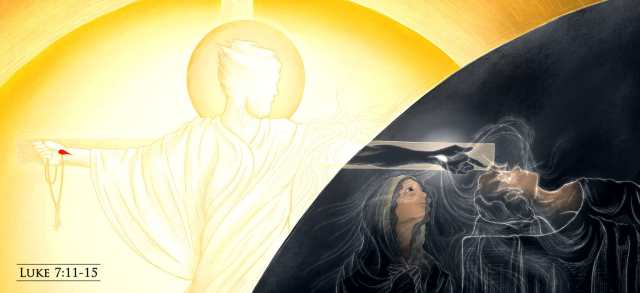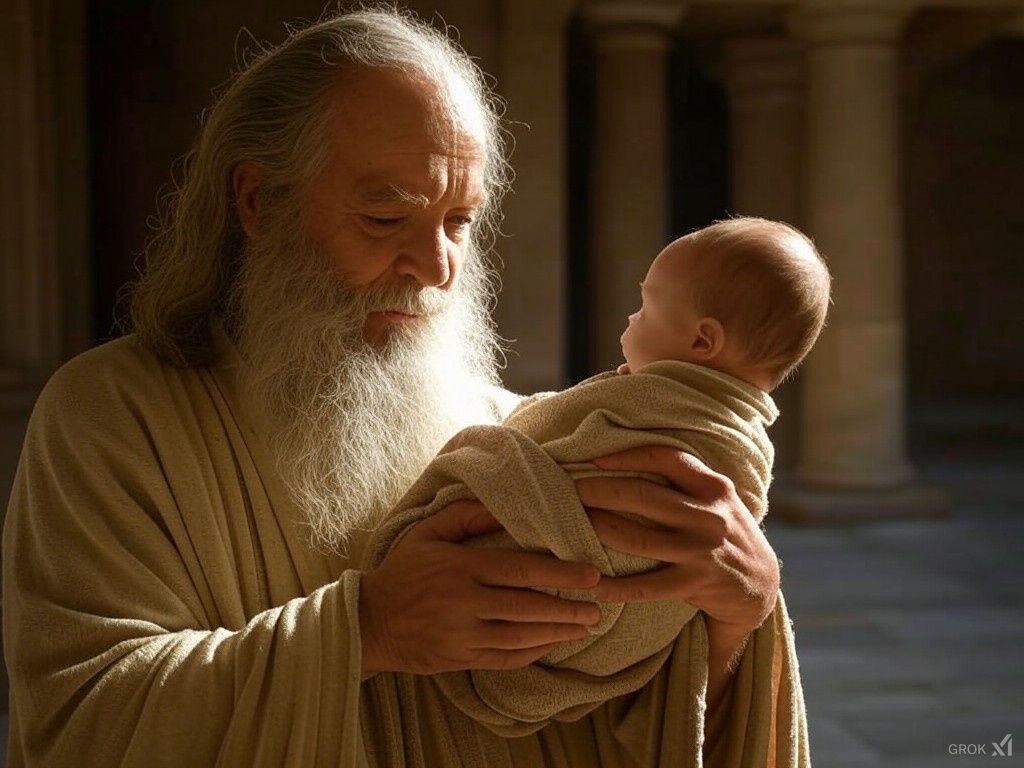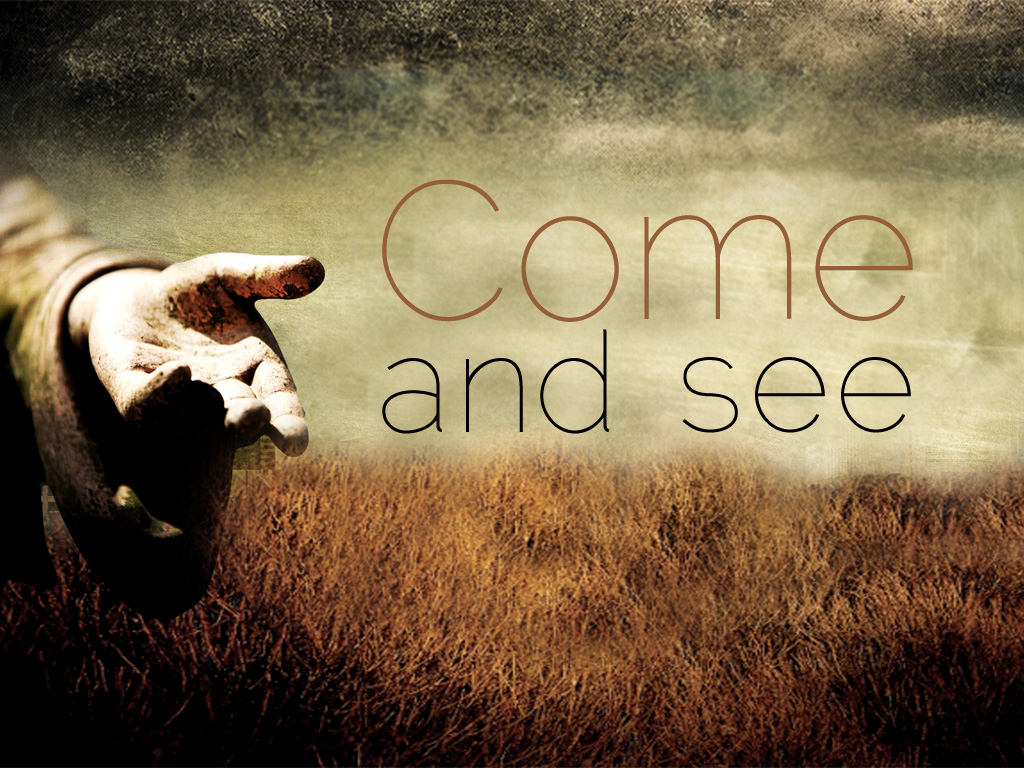11 Soon afterward he went to a town called Nain, and his disciples and a great crowd went with him. 12 As he drew near to the gate of the town, behold, a man who had died was being carried out, the only son of his mother, and she was a widow, and a considerable crowd from the town was with her. 13 And when the Lord saw her, he had compassion on her and said to her, “Do not weep.” 14 Then he came up and touched the bier, and the bearers stood still. And he said, “Young man, I say to you, arise.” 15 And the dead man sat up and began to speak, and Jesus gave him to his mother. 16 Fear seized them all, and they glorified God, saying, “A great prophet has arisen among us!” and “God has visited his people!” 17 And this report about him spread through the whole of Judea and all the surrounding country.
In the name of Jesus. Amen.
One of the great mysteries of Scripture is that Jesus is fully God and fully Man. Saying that isn’t hard; you’ve probably grown up saying it. But believing that Jesus is both 100% God and Man is hard to believe – especially when it comes to Jesus’ life here on earth. As the Son of God, Jesus is eternal, all-powerful, and all-knowing, but as a Man, Jesus didn’t always fully use His divine rights and attributes. As God, Jesus all-powerful, but as a man, He still had to eat (Lk. 4:2), His body got tired and needed sit after a long walk (Jn. 4:6), and He had to sleep (Lk. 8:23). Because Jesus is God, He is all-knowing. He had known from all eternity that He would meet this funeral procession at the gate of Nain. But as a man, it wasn’t as though Jesus woke up that morning thinking, “Oh, today’s the day I’ll raise that boy in Nain.”
The way Luke records this event, he makes it clear that Jesus didn’t intentionally go to Nain for the purpose of raising this boy from the dead. Instead, Luke gives us the impression that Christ just happened to be going by the city at the precise moment this boy, widow, and funeral procession was exiting the city gate. This resurrection is very different from what we see in John 11, when Jesus raises Lazarus.
In John 11, Christ does use His divine omniscience. Jesus is a long way from where Lazarus lived when He gets a message that Lazarus is sick, but He doesn’t move an inch. He stays put. He says that Lazarus’ sickness would not end in death and that it was for the glory of God (Jn. 11:4). Then, Jesus waits two more days before He finally decides to go to Lazarus’ house because He knows that Lazarus has died, but our Lord says that He is going to wake Lazarus from the sleep of death (Jn. 11:14, 11). By those statements before Lazarus’ resurrection, we know that Jesus did plan on going to Lazarus’ grave for the purpose of raising him even though no one told Jesus that Lazarus had died.
But this resurrection miracle is different. No one had summoned Jesus to come and help like they would for some of the other miracles (Lk. 7:1-10; 8:40-56). His presence wasn’t requested at the gate of Nain. He just happens to be at the gate at that very moment. But even though Jesus intended to pass by the city, His compassion for the mother means that He has to stop and raise her son.
Dear saints, your Savior is no priest or Levite who passes by and leaves someone for dead in the ditch (Lk. 10:30-32). No. Your Savior is the Good Samaritan. He sees the widow and her dead son coming out of the gate, and He has compassion. He interrupts that march toward the grave. He pours on the medicine of His Word by telling that mother to stop weeping, and He raises her son. In that moment, the gate of Nain was more than just a way to enter or exit the city. It was much more significant than that. The gate was the threshold between life and death, and it was the place where the citizens of Nain encountered and recognized the God who had come in the flesh to visit His people (Lk. 7:16).
Throughout the Bible, gates were always incredibly important places. Generally, when we think about a gate, we only think about its purpose. A gate exists to be either a barrier to block entrance or a doorway to grant it. Gates separate insiders from outsiders, allies from enemies, friend and family from foe. That’s probably all we imagine when we think about gates. But in the ancient world, gates were much more significant than that. In the Bible, gates were important places for commerce, politics, and justice.
The city gate was where citizens would typically meet (Pr. 1:21). The gate is where business deals and transactions were made (Ru. 4:11). Leaders would have people assemble at the gate so they could make important announcements (2 Ch. 32:6; Neh. 8:1, 3), which is why prophets and priests would proclaim God’s Word at the gates (Is. 29:21; Am. 5:10; Jer. 17:19-20). Instead of courthouses like we have today, trials took place at the city gate (2 Sam. 15:2). The gate was where you would learn about everything that was going on in the city (Gen. 19:1; Ps. 69:12; Est. 2:21).
So, in this reading, it’s likely that almost the entire town of Nain was there, at the gate. The gate would have already been busy and crowded just because of the normal, day-to-day things that took place at the gate. And it would have been even busier than normal because this boy’s funeral. The mother and the mourners were carrying her son through the gate to lay him to rest outside of the city, away from the living. So, again, that gate was the threshold between life and death. But there, at the gate stood the Author of Life (Act. 3:15), and Jesus does not let death cast this boy outside.
Now, before I go on here, I need to say that this miracle is an actual, historical event that really happened. Because it happened, it reveals that Jesus is the long-promised prophet (Dt. 18:15) and that God has visited His people (Lk. 7:16). But even more than that, the Holy Spirit inspired Luke to record this event for your comfort because this resurrection miracle is a glimpse into your story.
When God created all things, He gave Adam and Eve a home in the Garden of Eden. But when they chose to sin and rebel against God by eating the forbidden fruit, they were cast out of Eden. Now, Eden is never described as having a gate, but it is described as having borders made by four rivers. And when Adam and Eve are expelled from Eden, God, in His mercy, sent a cherub with a flaming sword to protect the way to the Tree of Life to prevent mankind from living forever because we would have lived forever in sin (Gen. 3:23-24). So, even though Eden is never mentioned as having a gate, the idea of a gate is certainly there. It is right to say that the cherub shut the gate to Eden and to an eternal life in sin and death.
God did not want the path to life to be forever blocked by a gate, but He had to do something before the gate could be reopened. God had to send Jesus to pay the penalty for your sin, my sin, and the sin of all mankind (1 Jn. 2:2). By Jesus’ death and resurrection, the gates to Eden, to paradise, and to eternal life free from sin are now open for you.
And even better, now that Christ is raised and ascended, He always and fully uses His divine attributes. He sees your sorrow and has compassion on you. He sees you when you are lost and outside of the gates. He runs to embrace you and bring you unto Himself as His child (Lk. 15:20-24). Christ uses all of His divine power to bring you back to Himself through the gates that He has opened for you.
One of the most beautiful scenes in all Scripture is the new heavens and earth in Rev. 21. The New Jerusalem is described as having twelve gates, three gates on each side of the city, and all twelve gates are made out of a single pearl (Rev. 21:12-13, 21). And the most wonderful thing about those gates is that they stand wide open – never to be shut (Rev. 21:25). They can remain open without any danger because when Christ returns, all your enemies are utterly defeated and cast out forever.
In that blessed, eternal city, every tear is wiped away. Mourning is turned into dancing (Ps. 30:11; Jn. 16:20). There will be no more pain because this fallen world will have passed away (Rev. 21:4). In that city, all the children of God dwell together because they are raised, never to die again (Ro. 6:7-11).
So, you who are dead in sin, know that God is able to do far, far, far more abundantly than all you ask or think (Eph. 3:20). Hear your Savior’s call. Rise from your deadness. Christ, who is the Resurrection and the Life, has given you to the rest creation to be a blessing.
Dear saints, you have been raised to new life. So, enter His gates with thanksgiving and His courts with praise. To Christ Jesus be glory in the Church throughout all generations, forever and ever (Eph. 3:21). Amen.
The peace of God, which surpasses all understanding, will guard your hearts and minds in Christ Jesus (Php. 4:7). Amen.




 Luke tells us that those shepherds, who were minding their own business, suddenly found themselves surrounded by the shining, dazzling glory of the Lord. The surprising, unexpected thing is not the existence of God’s glory. God’s glory shining is something that happens throughout the Scriptures.
Luke tells us that those shepherds, who were minding their own business, suddenly found themselves surrounded by the shining, dazzling glory of the Lord. The surprising, unexpected thing is not the existence of God’s glory. God’s glory shining is something that happens throughout the Scriptures. This went on for centuries until the King Solomon finished construction of the Temple. When the Ark of the Covenant was brought into the Temple, the cloud descended into the most Holy Place, and the priests had to leave because God’s glory filled the Temple (1 Kgs. 8:10-11; 2 Chron. 5:13-14). God no longer dwelt in the tent of the Tabernacle; now, He dwelled in the house of the Temple which was where heaven and earth intersected. And still, year after year, the high priest would enter the most holy place be the representative of the people and meet with God behind the smoke made by the incense and the cloud that subdued God’s glory (Ex. 25:21-22).
This went on for centuries until the King Solomon finished construction of the Temple. When the Ark of the Covenant was brought into the Temple, the cloud descended into the most Holy Place, and the priests had to leave because God’s glory filled the Temple (1 Kgs. 8:10-11; 2 Chron. 5:13-14). God no longer dwelt in the tent of the Tabernacle; now, He dwelled in the house of the Temple which was where heaven and earth intersected. And still, year after year, the high priest would enter the most holy place be the representative of the people and meet with God behind the smoke made by the incense and the cloud that subdued God’s glory (Ex. 25:21-22). He is there so He can grow up and walk among us in the towns and streets of Galilee, Judea, and Jerusalem. He is there so He can be betrayed, arrested, beaten, tried, crucified, loaded up with your sin, die, and rise again.
He is there so He can grow up and walk among us in the towns and streets of Galilee, Judea, and Jerusalem. He is there so He can be betrayed, arrested, beaten, tried, crucified, loaded up with your sin, die, and rise again. 19 Therefore whoever relaxes one of the least of these commandments and teaches others to do the same will be called least in the kingdom of heaven, but whoever does them and teaches them will be called great in the kingdom of heaven. 20 For I tell you, unless your righteousness exceeds that of the scribes and Pharisees, you will never enter the kingdom of heaven.
19 Therefore whoever relaxes one of the least of these commandments and teaches others to do the same will be called least in the kingdom of heaven, but whoever does them and teaches them will be called great in the kingdom of heaven. 20 For I tell you, unless your righteousness exceeds that of the scribes and Pharisees, you will never enter the kingdom of heaven. Sure, you aren’t Lady Macbeth yelling at the blood of Duncan to wash off your hands, but you are guilty of murder before God. You have been angry with others. You have called others, “Fool.” You have held grudges. You have refused to ask your neighbor for forgiveness. And Jesus goes on to the other Commandments as well – lust is adultery and fornication, gossip is perjury, etc.
Sure, you aren’t Lady Macbeth yelling at the blood of Duncan to wash off your hands, but you are guilty of murder before God. You have been angry with others. You have called others, “Fool.” You have held grudges. You have refused to ask your neighbor for forgiveness. And Jesus goes on to the other Commandments as well – lust is adultery and fornication, gossip is perjury, etc.
You must be logged in to post a comment.